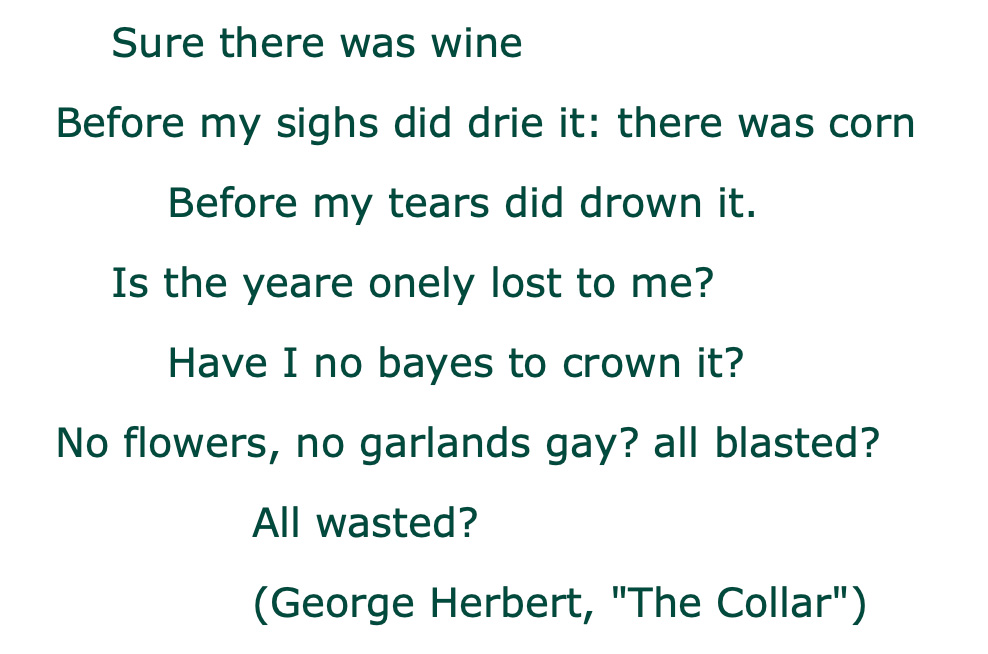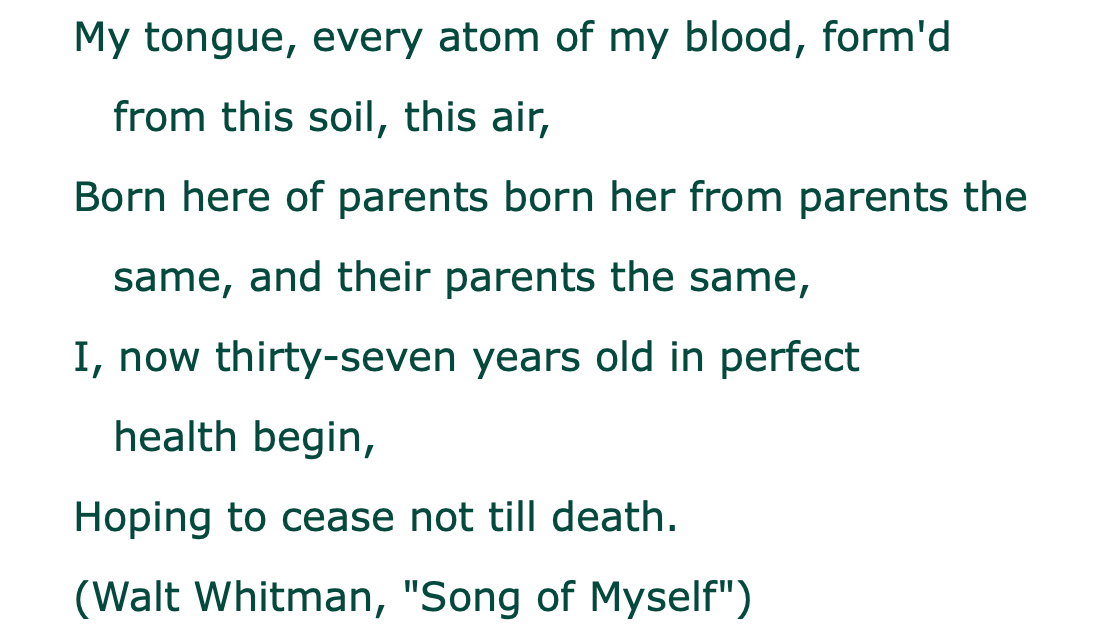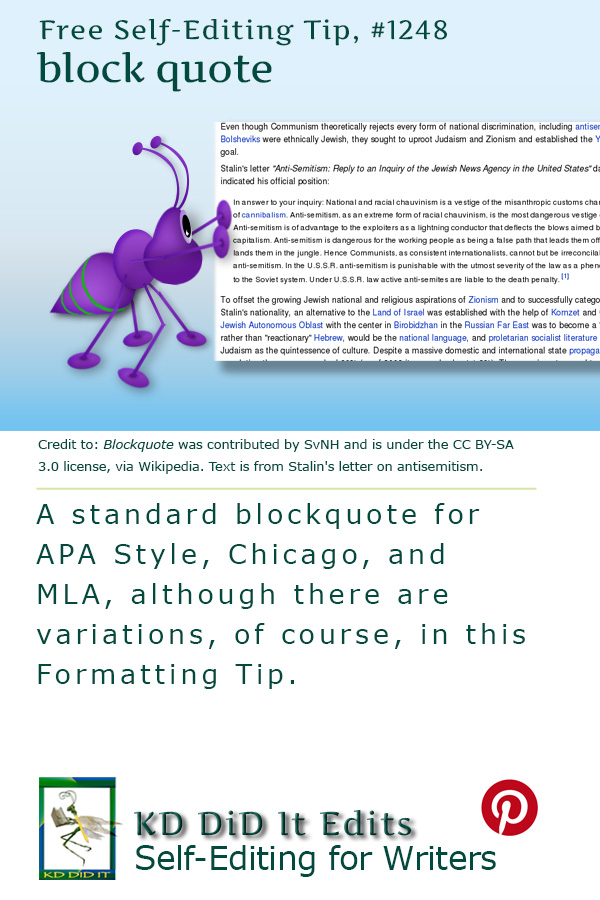A block quote (<blockquote> in HTML) is a type of formatting for lengthy quotes.
A blockquote is formatted differently than regular quotations and serves to emphasize a quotation, excerpt, or synopsis in a publication whether it’s in print or on the Internet.
The various style manuals have their own rules, which should be followed whether it is in hardcopy or in an electronic format.
Note that block quotations should be used sparingly. Don’t allow the source’s voice to overwhelm your own. One way around this is to quote bits of the text incorporating them into your own voice. Doing this demonstrates that you are interpreting the information and not just reporting it.
The HTML Blockquote Issues
It was Ashley‘s article on blockquotes that set me off. I couldn’t believe that people would actually use <blockquote> for decoration.
It should never, ever be done on a web page. It’s a question of accessibility and hierarchy! If you want a color background for text, there are ways to use CSS/HTML for this and never a blockquote.
Again, a blockquote is all about a quotation (of at least 40 words!) from a person, book, or other publication, or of a synopsis or excerpt.
It may seem like a small thing, but a huge part of SEO is having valid code that makes sense to search engines and other kinds of readers (like text-to-speech programs).
NOTE: Blockquote is the term used as code on the Internet while block quote is used in print.
Exploring Later . . .
You may be interested in “The Silent Comedian, or When Quotes = Sarcasm“, “Quotation Marks“, Quotation versus Quote“, and “HTML Creates Single Quotes within Double Quotes“.
Formatting Tips started . . .
. . . as my way of dealing with a professional frustration with words that should have been capitalized or italicized, in quotes or not, what should be spelled out and what can be abbreviated, proper styling for the Latin names of plants, the proper formatting and usage of titles and more in manuscripts I was editing as well as books I was reviewing. It evolved into a sharing of information with y’all. I’m hoping you’ll share with us any questions you’ve had on this subject that have been a bête noire for you from either end.
If you found this post on “The Block Quote” interesting, consider subscribing to KD Did It, if you’d like to track this post for future updates.
| Block Quote / Blockquote | |||
| Formatting | |||
| Definition: A lengthy quote, poem, dialogue, etc., which has specific formatting requirements per the relevant style guide. | |||
| APA Style | Rules: The primary rule is that the quote must be 40 words or more.
APA is widely used for research papers in the social sciences, education, psychology, etc. |
||
|
Return to top or post contents |
The formatting requires:
|
||
|
Computer users often disagree about which operating system is best: Mac or PC. Oyler (2010) stated that one operating system is not better than the other, but that one may be better suited for different purposes than the other. She explained by saying that Macs are often the best option for users who wish to work with video or picture manipulation. Macs are also very user friendly, which may benefit consumers who are new to computers. PCs, however, run Microsoft Office Suite the best. Therefore, students might find that a PC is their best option because it can run Microsoft Word and PowerPoint the smoothest. (Oyler, 2010, p. 48) Conversely, Jones (2010) disagreed with the statement that Macs work with graphics such as video and pictures better than PCs, stating that PCs can be modified to work as well as Macs. |
|||
| Chicago Manual of Style (CMOS) | Rule: Use a blockquote for 100+ words, at least five lines, or at least two paragraphs.
CMOS is widely used in the science and humanities. |
||
|
Return to top or post contents |
The formatting requires that:
|
||
Rule: Cite the source of the block quote in one of two ways:
|
|||
| Heinrich Wölfflin describes the general representational forms of the fifteenth and sixteenth centuries:
If there is in fact a qualitative difference between the fifteenth and sixteenth centuries, in the sense that the fifteenth had gradually to acquire by labour the insight into effects which was at the free disposal of the sixteenth, the (classic) art of the Cinquecento and the (baroque) art of the Seicento are equal in point of value. The word classic here denotes no judgment of value, for baroque has its classicism too.5 Or If there is in fact a qualitative difference between the fifteenth and sixteenth centuries, in the sense that the fifteenth had gradually to acquire by labour the insight into effects which was at the free disposal of the sixteenth, the (classic) art of the Cinquecento and the (baroque) art of the Seicento are equal in point of value. The word classic here denotes no judgment of value, for baroque has its classicism too. (Wölfflin, 115) |
|||
| Rule: The initial letter may be lowercased if the syntax demands it. | |||
|
In discussing the reasons for political disturbances Aristotle observes that revolutions also break out . . . |
|||
Rule: The text following a block quotation may be of two type:
|
|||
| Part of the same paragraph:
“There is no safe trusting to dictionaries and definitions,” observed Charles Lamb. We should more willingly fall in with this popular language, if we did not bind brutality sometimes awkwardly coupled with valour in the same vocabulary . . . has something in it wonderfully diverting. (“Popular Fallacies”, Essays of Elia) “In short” says Crane, summarizing Gordon’s philosophy, Starts a new topic: “There is no safe trusting to dictionaries and definitions,” observed Charles Lamb. We should more willingly fall in with this popular language, if we did not bind brutality sometimes awkwardly coupled with valour in the same vocabulary . . . has something in it wonderfully diverting. (“Popular Fallacies”, Essays of Elia) Bischoff, however, states that . . . |
|||
Rule: If you quote two or more paragraphs and the first sentence is the beginning of a paragraph — subsequent paragraphs are indented.
|
|||
|
In the aftermath of the hound sighting, Sherlock Holmes keeps his cool: Sir Henry lay insensible where he had fallen. We tore away his collar, and Holmes breathed a prayer of gratitude when we saw that there was no sign of a wound and that the rescue had been in time. Already our friend’s eyelids shivered and he made a feeble effort to move. Lestrade thrust his brandy-flask between the baronet’s teeth, and two frightened eyes were looking up at us. “My God!” he whispered. “What was it? What, in heaven’s name, was it?” “It’s dead, whatever it is,” said Holmes. (Doyle 82) OR strict adherence Sir Henry lay insensible where he had fallen. We tore away his collar, and Holmes breathed a prayer of gratitude when we saw that there was no sign of a wound and that the rescue had been in time. Already our friend’s eyelids shivered and he made a feeble effort to move. Lestrade thrust his brandy-flask between the baronet’s teeth, and two frightened eyes were looking up at us. “My God!” he whispered. “What was it? What, in heaven’s name, was it?” “It’s dead, whatever it is,” said Holmes. (Doyle 82) OR first part is omitted . . . where he had fallen. We tore away his collar, and Holmes breathed a prayer of gratitude when we saw that there was no sign of a wound and that the rescue had been in time. Already our friend’s eyelids shivered and he made a feeble effort to move. Lestrade thrust his brandy-flask between the baronet’s teeth, and two frightened eyes were looking up at us. “My God!” he whispered. “What was it? What, in heaven’s name, was it?” “It’s dead, whatever it is,” said Holmes. (Doyle 82) |
|||
| Rule: As block quotes do not use quotations at the start/end, any quotations within the quote must be edited to reflect double quotation marks (“_”) are used first, then single quotation marks (‘_’) within those. | |||
|
The narrator then breaks in: Imagine Bart’s surprise, dear reader, when Emma turned to him and said, contemptuously, “What ‘promise’?” |
|||
| Poetry | Rules: Use a blockquote when a poem consists of two or more lines of verse. | ||
|
Return to top or post contents |
The formatting requires that:
|
||
| Rule: When quoting verse, maintain original line breaks. | |||
|
There was an Old Man with a beard, Who said, ‘It is just as I feared! Two Owls and a Hen, Four Larks and a Wren, Have all built their nests in my beard! |
|||
| Rule: Some poems have unusual indentation and must be followed.
NOTE: This will apply to hardcopy, as the reader of an eBook has control of font size. Consider using an image to ensure the unusual indentations will always be proper (as I did in this example). |
|||

|
|||
| Rule: Some poems have long lines or the runovers (lines too long to stay on one line).
NOTE: This will apply to hardcopy, as the reader of an eBook has control of font size. Consider using an image to ensure the runovers will always be proper (as I did in this example). |
|||

|
|||
| MLA | Rules: The block format is a freestanding quote that does not include quotation marks.
MLA is widely used in the humanities. |
||
|
Return to top or post contents |
The formatting requires that:
Source: MLA |
||
| Drama | Rules: A blockquote is always used when quoting dialogue between characters, as in a play. | ||
|
Return to top or post contents |
The formatting requires that:
|
||
| At the beginning of Shakespeare’s The Tempest, chaos erupts on a ship at sea before the cast of characters ends up on Prospero’s island:
MARINERS. All lost! to prayers, to prayers! all lost! BOATSWAIN. What, must our mouths be cold? GONZALO. The king and prince at prayers! let’s assist them, SEBASTIAN. I’m out of patience. ANTONIO. We are merely cheated of our lives by drunkards: This wide-chapp’d rascal,—would thou mightst lie drowning The washing of ten tides! GONZALO. He’ll be hang’d yet, Though every drop of water swear against it, And gape at widest to glut him. A confused noise within: “Mercy on us!”—“We split, we split!”—“Farewell my wife and children!”—“Farewell, brother!”—“We split, we split, we split!” (1.5.3-14) |
|||
| Poetry | Rules: The block quote is used for direct quotations that are longer than three lines of poetry. | ||
|
Return to top or post contents |
The formatting requires that:
|
||
|
Gwendolyn Brooks’ poem “To John Oliver Killens in 1975” addresses another African American writer of the day: John, look at our mercy, the massiveness that it is not. look at our “unity”, look at our “black solidarity.” Dim, dull, and dainty. (1-5) |
|||
| Rule: A line of poetry in a blockquote that is too long to fit within the right margin of the page should be continued on the next line and indented an additional one-quarter inch. | |||
| Allen Ginsberg’s famous poem “Howl” begins:
I saw the best minds of my generation destroyed by madness, starving hysterical naked, dragging themselves through the negro streets at dawn looking for an angry fix, Assume this breaks onto another page. angelheaded hipsters burning for the ancient heavenly connection to the starry dynamo in the machinery of night, (9) |
|||
| Prose | General Rule: The block quote is used for direct quotations that are longer than four lines of writing. | ||
| Rule: If you quote a single paragraph (or just part of one), do not indent the first line of the block quote more than the rest. | |||
|
It is not until near the end of The Hound of the Baskervilles that the hound itself is actually seen: A hound it was, an enormous coal-black hound, but not such a hound as mortal eyes have ever seen. Fire burst from its open mouth, its eyes glowed with a smouldering glare, its muzzle and hackles and dewlap were outlined in flickering flame. Never in the delirious dream of a disordered brain could anything more savage, more appalling, more hellish be conceived than that dark form and savage face which broke upon us out of the wall of fog. (Doyle 82) |
|||
Rule: If you quote two or more paragraphs and the first sentence is the beginning of a paragraph:
Source: How |
|||
|
In the aftermath of the hound sighting, Sherlock Holmes keeps his cool: Sir Henry lay insensible where he had fallen. We tore away his collar, and Holmes breathed a prayer of gratitude when we saw that there was no sign of a wound and that the rescue had been in time. Already our friend’s eyelids shivered and he made a feeble effort to move. Lestrade thrust his brandy-flask between the baronet’s teeth, and two frightened eyes were looking up at us. “My God!” he whispered. “What was it? What, in heaven’s name, was it?” “It’s dead, whatever it is,” said Holmes. (Doyle 82) |
|||
Rule: If you quote two or more paragraphs and the first sentence is NOT the beginning of a paragraph:
|
|||
|
In the aftermath of the hound sighting, Sherlock Holmes keeps his cool: . . . We tore away his collar, and Holmes breathed a prayer of gratitude when we saw that there was no sign of a wound and that the rescue had been in time. Already our friend’s eyelids shivered and he made a feeble effort to move. Lestrade thrust his brandy-flask between the baronet’s teeth, and two frightened eyes were looking up at us. “My God!” he whispered. “What was it? What, in heaven’s name, was it?” “It’s dead, whatever it is,” said Holmes. (Doyle 82) |
|||
C’mon, get it out of your system, bitch, whine, moan . . . which words are your pet peeves? Also, please note that I try to be as accurate as I can, but mistakes happen or I miss something. Email me if you find errors, so I can fix them . . . and we’ll all benefit!
Satisfy your curiosity about other Formatting Tips by exploring its homepage or more generally explore the index of self-editing posts. You may also want to explore Book Layout & Formatting Ideas, Formatting Tips, Grammar Explanations, Linguistics, Publishing Tips, the Properly Punctuated, Word Confusions, Writing Ideas and Resources, and Working Your Website.
Resources for The Block Quote
Some of these links may be affiliate links, and I will earn a small percentage, if you should buy it. It does not affect the price you pay.
Ashley. “A <blockquote> is Not Just a Pretty Box.” Nose Graze. 17 Feb 2014. Accessed 14 Jan 2024. <https://www.nosegraze.com/dont-use-blockquotes-to-make-pretty-boxes/>.
Cerros, Marissa. Sheldon Hentschke rev. “Chicago Style Formatting Guidelines.” San José State University Writing Center. Last updated Summer 2016. Accessed 14 Jan 2024. <https://www.sjsu.edu/writingcenter/docs/handouts/Chicago%20Style.pdf>.
“Citations: Block Quotations.” Academic Guides. n.d. Accessed 14 Jan 2024. <https://academicguides.waldenu.edu/writingcenter/apa/citations/blockquotations>.
“How Should I Style Paragraphs in a Block Quotation?” MLA Style Center. 12 Sept 2019. Accessed 14 Jan 2024. <https://style.mla.org/paragraphs-block-quotations/>.
“MLA Style Guide: 8th Edition: blockquote.” Lib Guides. Hamersly Library. Western Oregon University. Last updated 5 Jan 2023. Accessed 14 Jan 2024. <https://research.wou.edu/mla/mla-blockquote>.
The Modern Language Association of America. MLA Handbook, ed 9. The Modern Language Association of America, 2021. <https://amzn.to/48ywAjs>. Ebook.
Pinterest Photo Credits:
Blockquote was contributed by SvNH and is under the CC BY-SA 3.0 license, via Wikipedia. Text is from Stalin’s letter on antisemitism.


